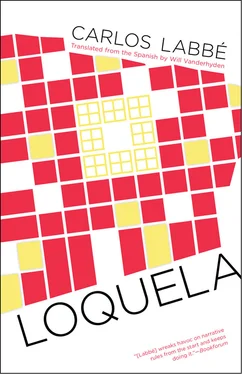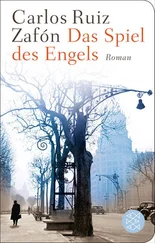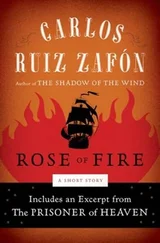He had the impression that there was nothing alive in this notebook. He asked himself if at some point this page — meticulously concocted with twists and turns and more twists and turns — might form part of a book, whether this machine of actions would cease. And he tore it out. He read the next one and the next. Always the same, fifty pages of chasing after a woman who reveals no clear reasons for why she’s being pursued. It was already two in the afternoon. He paused, reading over the ending: the protagonist didn’t react when a man shoved him. He left the bathroom, convinced he should confront the fat man behind the bar. He’d ask for a drink. And when the guy came over he’d warn him to stop playing games, he’d been found out. Stop calling the albino girl, no more men following her home or threatening him in the bathroom while he was washing his hands, he’d say, his voice grave. He made his way through the multitude that was moving euphorically to the sounds of a popular song. Suddenly the lights came down, a rush of couples holding hands descended on the dance floor. The protagonist was climbing the stairway to the second level when he stopped: on the dance floor, in a corner, he recognized the confident stride and preoccupied face of the albino girl. He stumbled his way back down, losing her for a second in the crowd; he had a hunch he’d find her near the exit. He grabbed her arm and asked her what she was doing there. The girl — blonde hair, straight back, tight dress — looked at him uncomprehendingly: it was someone else. He apologized, embarrassed by his mistake. Back on the stairs a bouncer blocked his assent; the police were clearing everyone out, something unfortunate had gone down between the fat bartender and a drunk with a broken glass. The bartender defended himself, they fought, there were blows, and the one stabbed the other. Carlos stopped reading. He thought that the protagonist, shaken by the coincidence, should’ve marveled at his luck, but he didn’t. Instead he shoved the bouncer who was describing the situation out of his way and went up to see with his own eyes what had happened, and ended up getting kicked out. The error was that his characters never noticed what was right in front of them and were instead always trying to see past it.
He stared at the pile of torn-out pages sitting on his desk. He became aware of the connection between that particular chapter and a phone call from Elisa that’d woken him up one Friday at six in the morning a few months ago. Her voice hesitated when she told him that she’d gone out dancing with her friends that night, after drinking all afternoon and reminiscing about existential discussions they’d had in high school. That night, at the club, they ran into one of her ex-boyfriends, and before long he and Elisa were conversing in close proximity, then he convinced her to dance. Just when she said yes, Elisa spotted him, Carlos, leaning on the bar, staring out across the dance floor. She shuddered and went over to him, but it turned out to be some random guy who tried to wrap his arms around her, proud of having seduced her with a single look. That morning Elisa, drunk, asked his forgiveness over the phone. She also told him that she was sure he’d appeared there in that instant to look out for her, to make sure she didn’t do something stupid.
The sound of the door being unlocked distracted Carlos and he got up and went to see who it was. Elisa walked in slowly, carrying heavy bags that she set down on the floor; she came over and kissed him. She made fun of the pajamas he was still wearing. Seeing the torn-out pages on the desk, she didn’t bother asking what had happened, she just went into the other room to find a box of paper clips. One by one she began putting the pages back into the notebook, trying to follow the order of the story, but Carlos grabbed her from behind and began to lightly bite the nape of her neck until she gave him her attention.
August 18 th
Blanchot again, but read this time in Librería Gradiva, near my apartment, so I’ll cite it from memory: to write “I am alone” is comical, a farce, because the simple fact of writing it refutes it. The paper, the reader who reads the phrase, the proofreader, the publishing house, the publisher’s propaganda, newspapers, the translation, a citation in a foreign text, then another and another and on and on until it grows commonplace and gets used in some magazine, on TV, in everyday conversation, and, in the end, it loses all meaning. Hundreds of people accompany me when I write that I am alone: writing is a renunciation of solitude. No one writes to read themselves, no intimate diary is private. And so I impersonate my voice in these pages (but of all the voices, which one is mine?) to make them resemble an article by Fernando Pérez about Adolfo Couve that I read in the magazine Vértebra . The honesty those two taught me, which I love to resort to, compels me to transcribe the first footnote from that article: “The text is composed by alternating fragments from my diary (often transformed, tightened up, corrected) with my observations and outside citations inserted into the text a posteriori [. .] as a kind of counterpoint, to compensate for potential excesses of subjectivity.” In these pages, I’ve copied the form in which Pérez approaches his analysis of Couve’s work; and yet I’d forgotten this model for my voice until this afternoon, when I found the magazine in question among my photocopies. (I should just write, I’ll delete all the “I”s from the sentences later, I’ll remove the allusions to easily identifiable individuals, I’ll erase the overly personal fragments, I’ll make corrections to avoid problems, no big deal. I should take a moment to laugh at myself for having pointed out the problem of solitude, for checking to see if someone is sitting down beside me to read what I’m writing, for noticing the inevitable curiosity that overcomes you confronting a page covered in the handwriting of someone you know.)
I go back to reading Violeta’s notebooks, without any value judgment at this point. I had an erotic dream about her; it wasn’t entirely her, but it was an albino girl. In the morning, Alicia and I are sitting in adjacent seats. She looks around with a peculiar expression that I don’t recognize, I wonder if I might have something to do with that look, if it’s true that it seemed to call me phony, phony Carlos. She leans back against the wall and for a few seconds her thin shoulder rests against my arm. Call me a fool, but I wanted for the day to stop passing, for that boring class where our surfaces touched not to end. But that night, with a kind of bitterness, I couldn’t tell if it was a put-on or not, she said: I want the Carlos from last week, I don’t want you. (But how is it possible that I’m a substitute for the Carlos she knew if she is the only person I’ve told [as far as I remember] about what’s afflicting me? It must be that what’s actually happening isn’t easy to describe, the proof being that I’m still unable to slip a single certainty into this notebook.)
That afternoon I talked to my mom on the phone. It’s cold in Rancagua. My grandmother is suffering from migraines and the doctors can’t figure out what’s wrong with her: it’s not her blood pressure, not her medication, not changes in temperature. They say she’s really lonely. (And if during her birthday party they were to make the whole family be quiet so she could get up from her armchair — where she’d been sitting motionless all afternoon, acting like she wasn’t there — and say: “My children, I have to tell you, without beating around the bush, that loneliness is making me ill,” what would my father, my uncles, my cousins do? Who — out of all of us who feel alone [all of us?] — would leave their life behind to be with her? Without a doubt none of us would take her words seriously. Without a doubt none of this would ever happen: my grandmother asks for a general silence only to thank God for giving her a family like this one.)
Читать дальше












